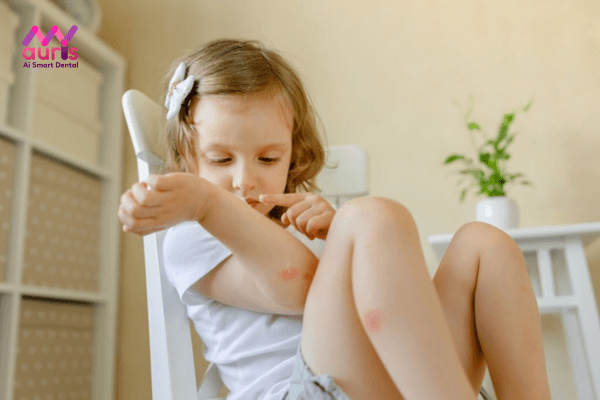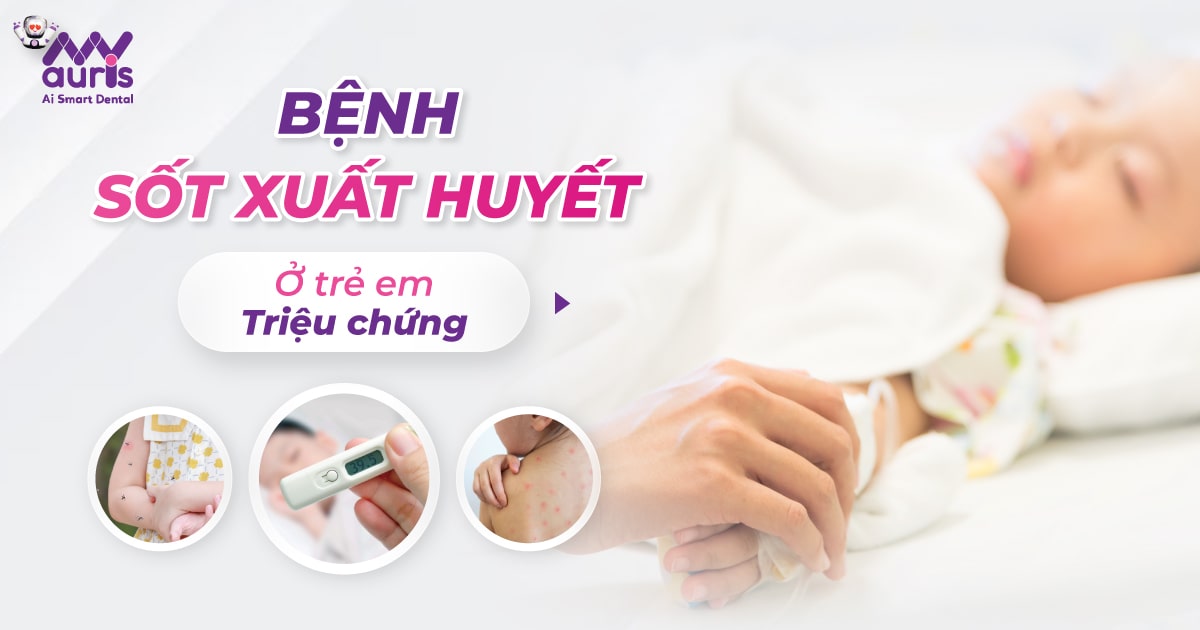Dengue fever is one of the most deadly diseases in children. Therefore, parents need to know more about the symptoms of dengue fever in children so that they can promptly detect it and take their children to see a doctor for timely treatment. The purpose is to avoid unwanted complications. My Auris will accompany you right in this article to learn about the causes and some necessary information about the disease.
Learn about the symptoms of dengue fever in children em
Symptoms of dengue fever in children will manifest in many different forms and become complex. The onset of the disease is often quite sudden, the progression of the disease is also quite rapid from mild to complex in 3 stages: Fever, danger, recovery. Specifically:
Fever phase

In the early stages of dengue fever symptoms, children There is often a sudden and continuous high fever. Young babies are often fussy and irritable. Older children often complain of nausea, headaches, loss of appetite, signs of skin congestion, muscle and joint pain, nosebleeds and bleeding gums, etc.
The results of blood tests at this stage will often not be clearly reflected. Specifically, red blood cell volume is mostly normal, platelet count is normal or gradually decreasing, while white blood cell count is often reduced.
Dangerous progressive stage
After the fever stage, children begin to enter the dangerous stage of the disease, usually this stage will be about 3 to 7 days after getting sick. Symptoms of dengue fever at this stage may be that the baby still has a fever or has begun to gradually improve, the child has plasma leakage – the amount of plasma in the machine leaks out massively, causing the abdomen to swell, usually lasting 1 to 2 days, with a high risk of death for the baby.
Thus, when parents take their child for a check-up, they can see that the child has effusion in the membranes. The lungs, peritoneum, and liver are abnormally enlarged. If the condition of plasma leakage is severe, it can lead to shock, with easily recognizable signs such as lethargy, cold extremities, struggle, rapid pulse, low blood pressure or inability to measure blood pressure.

Especially children with subcutaneous bleeding or bruises, Bleeding spots are scattered or concentrated on the front of the legs, the inside of the arms, abdomen, thighs, etc. Parents, please pay attention and take your child to the doctor as soon as possible.
However, you need to note that bleeding is not a mandatory manifestation of the symptoms of dengue fever in children. Because it is possible to carry the disease but show absolutely no symptoms of bleeding. Therefore, whether or not there are enough symptoms, the disease may still be in a dangerous stage, possibly causing death. One of the dangerous complications is that the child may go into shock, with signs of hypothermia, decreased blood pressure, decreased consciousness,…
With this dangerous stage, a blood test shows that the platelet count drops sharply to less than 100,000.mm3, in severe cases, the baby may have a blood clotting disorder,…
Recovery phase
After the dangerous phase, about 48 to 72 hours is the recovery phase, the child begins to lose fever and his condition also improves a lot. You start to have an appetite, your blood pressure becomes more stable, and you may urinate more often. When testing blood, the number of white blood cells increases rapidly, the number of platelets gradually returns to normal, but it will be slower than that of white blood cells.
Treating dengue fever in children like this
Currently, dengue fever still has no effective treatment. The main treatment methods are to help reduce the symptoms of dengue fever in children, while also preventing dangerous complications that may occur.

Parents need to pay attention to the following things in treating the disease to help their children recover quickly. cure the disease, limit the possibility of spread:
- Children take fever-reducing medicine as prescribed by the doctorspecialist.
- It is necessary to divide your baby’s meals into smaller portions and feed them liquid foods to ensure adequate nutrition and easier digestion.
- Let your baby drink plenty of water, supplement with oresol electrolyte solution (Use at the dosage prescribed by the doctor).
- Strengthen your baby’s immune system by providing foods with vitamin A, B, C,…
On the other hand, parents also need to pay attention to avoid the following:
- Do not apply quick fever-reducing methods to your baby, to limit the risk of hypothermia or damage to other organs in the body.
- Do not allow your child to be examined or given fluids at medical facilities or private clinics that are not qualified for medical examination and treatment.
- Do not shave because this can hurt or bleed your baby, causing infection.
- Do not expose your baby to the wind or bathe in cold water, only wipe your baby with warm water.
- Parents should absolutely not use untested folk remedies to treat their babies, causing some unfortunate consequences.
How to prevent dengue fever in children?
Killing mosquitoes and preventing mosquito bites is the most effective way to help prevent symptoms of dengue fever. Specifically for prevention, parents need to pay attention to the following points:

- Prevent mosquitoes from laying eggs by covering containers containing water.
- Destroy all larvae, as well as larvae.
- Turn over water containers, remove standing water and waste around the place where you live, and clean up.
- Use sprays or electric rackets to kill mosquitoes.
- Wear all kinds of clotheso long sleeves, close the window area to prevent mosquitoes from entering.
- Allow sick people to sleep under mosquito nets and avoid mosquito bites to limit the risk of spread.
It can be seen that the symptoms of dengue fever appear very quickly and can potentially cause many dangerous complications. Therefore, parents need to clearly understand the symptoms and treatment methods to properly care for their children and help them recover quickly. When there are suspicious signs, take your child to a medical facility to get the best diagnosis and treatment from a specialist.
Hopefully the above information can help you refer to the symptoms of dengue fever in children. This is a dangerous, life-threatening disease, so take your child to see a doctor as soon as possible when you see any unusual signs. During treatment, please pay attention to following instructions from a specialist. At the same time, change the appropriate nutritional regimen so that children can quickly recover.
Yen Nhi





